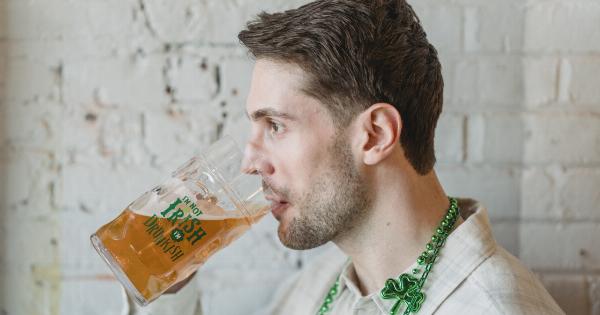Alcohol is a common part of many people’s lives, but it can become a problem for some. It’s important to understand the signs that you may have a problem with alcohol so that you can seek help if needed. Here are 30 signs to look out for:.
Physical Symptoms
1. You find yourself frequently craving alcohol.
If you find yourself regularly craving alcohol at different times throughout the day, this could be a sign that you have a problem.
2. You drink more than you intended to.
If you often find yourself drinking more than you planned or drinking for longer periods of time than intended, this could be a sign of problematic drinking.
3. You experience physical withdrawal symptoms when you stop drinking.
If you feel shaky, nauseous, or otherwise unwell when you try to stop drinking, this could be a sign that your body has become dependent on alcohol and needs it to function.
4. You drink to escape or cope with negative emotions or situations.
Using alcohol as a way to cope with stress, anxiety, or other negative emotions can lead to unhealthy drinking patterns.
5. You continue to drink despite experiencing negative consequences.
If you continue to drink even when it causes problems in your personal or professional life, this is a sign that you may have a problem with alcohol.
Emotional Symptoms
6. You feel guilty or ashamed about your drinking.
Feeling ashamed or guilty about how much you drink can be a sign that you recognize that your behavior is problematic.
7. You become defensive or angry when someone suggests you have a drinking problem.
Getting defensive or angry when someone suggests that you have a problem with alcohol can be a sign that you’re in denial about your drinking.
8. You become increasingly isolated from friends and family.
Alcoholism can lead to social withdrawal and isolation from loved ones.
9. You prioritize drinking over other activities or responsibilities.
If you consistently choose drinking over other important activities or responsibilities, this could be a sign that alcohol is becoming a problem for you.
10. You experience mood swings or changes in personality when you drink.
Drinking too much can cause mood swings, irritability, or changes in personality.
Social Symptoms
11. You frequently drink alone or in secret.
Drinking alone or in secret can be a sign that you feel guilty about your drinking and are trying to hide it from others.
12. Your interpersonal relationships become strained due to your drinking.
Alcoholism can lead to strained relationships with friends, family, and colleagues.
13. You experience blackouts or memory loss as a result of drinking.
Blacking out or experiencing memory loss as a result of drinking can be a sign that you’re drinking more than your body can handle.
14. You lie or make excuses about your drinking behavior.
If you find yourself lying or making excuses to justify your drinking, this could be a sign that you’re not being honest with yourself or others about your alcohol use.
15. You prioritize social activities that involve drinking over other activities.
If you consistently choose social activities that involve drinking over other types of activities, this could be a sign that alcohol is becoming a problem for you.
Work-related Symptoms
16. You show up to work hungover or still intoxicated from the night before.
Showing up to work under the influence can put your job and safety at risk.
17. Your job performance suffers due to your drinking habits.
If you find that your job performance is suffering as a result of your drinking, this could be a sign that alcohol is becoming a problem for you.
18. You’ve been disciplined at work for alcohol-related behavior.
If you’ve been disciplined at work for behavior related to your alcohol use, it’s a sign that your drinking habits are interfering with your professional life.
19. You engage in impulsive or risky behavior while drinking.
Drinking can lower inhibitions and lead to impulsive or risky behavior, such as making inappropriate comments or engaging in physical altercations.
20. You’ve missed work due to drinking or hangovers.
Missing work due to drinking or hangovers can be a sign of problematic alcohol use.
Health-related Symptoms
21. You experience symptoms of depression or anxiety related to your drinking.
Alcoholism can cause or exacerbate symptoms of mental health conditions such as depression or anxiety.
22. Your doctor has expressed concern about your alcohol use.
If your doctor has expressed concern about your alcohol use, it’s important to take that feedback seriously.
23. You experience physical health consequences related to your drinking.
Alcoholism can cause a range of physical health issues, such as liver disease, high blood pressure, and gastrointestinal problems.
24. You experience sexual health consequences related to your drinking.
Drinking too much can lead to sexual health consequences such as contracting sexually transmitted infections or experiencing sexual dysfunction.
25. You regularly drink to the point of passing out or vomiting.
If you regularly drink to the point of losing consciousness or vomiting, this could be a sign that you’re drinking too much.
Legal Symptoms
26. You have been arrested for a DUI or other alcohol-related offense.
If you’ve been arrested for DUI or another alcohol-related offense, it’s a sign that your drinking habits are putting you and others at risk.
27. You engage in illegal behavior while under the influence of alcohol.
Alcohol can impair judgment and lead people to engage in illegal behavior, such as theft, drunk driving, or drug abuse.
28. You’ve been in legal trouble related to your drinking.
If you’ve been in legal trouble related to your drinking, it’s a sign that alcohol is causing problems in your life.
29. You have a history of drunk driving or other alcohol-related offenses.
A history of DUI or other alcohol-related offenses is a sign that drinking has become a significant problem in your life.
30. You’re unable to stop drinking despite legal consequences.
If you’ve experienced legal consequences related to your drinking, yet you’re unable to stop drinking, this could be a sign of alcoholism.
Conclusion
If you’re experiencing any of these signs related to your alcohol use, it’s important to seek help.
There are many resources available to help people overcome problematic drinking habits, such as support groups, therapy, and medical treatment.






























